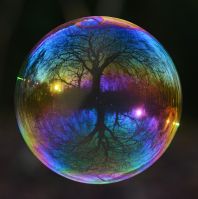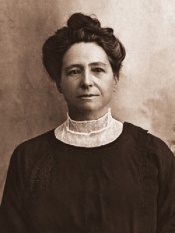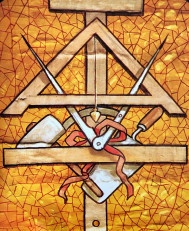Here the author explores the foundation of Masonic Ritual as influenced, shaped, and formed by the thoughts and mindset of the Brothers of the Lodge. Part I can be found here.
PART II: THE FOUNDATION – BUBBLES AND THOUGHT FORMS
By Very Ills..... Bro... Kristine Wilson-Slack 33o

A bubble is a self-organized structure that is the result of a new thermodynamic phase of matter; that is, when matter organizes itself differently from its surroundings as a result of applied energy, a bubble is formed. Bubbles are a low-energy state of matter; in that they take little energy to form and little energy to dissipate. Compare soap bubbles to a cardboard box; both contain air but the structures holding them together require little and much energy, respectively.
Bubbles are formed by energy and force; it is the result of one type of matter suspended or held energetically within another. Without going into the science too deeply, there have been experiments and theories regarding the idea that knowledge, information, and/or thoughts have substance – mass. Between Maxwell’s Demon and Einstein’s general relativity theory, people are quick to either propose or dismiss thoughts having energy, and thereby mass. It seems logical that at some level, by the creation of thoughts, the brain has expended energy, and therefore it is possible that thoughts have a very minute mass.
If thoughts have mass, can thoughts create bubbles?
In the latter part of the 19th C to the early 20th C, Bros. Annie Besant, C.W. Leadbeater, and A.P. Sinnett wrote extensively on the idea of thought forms.
From a letter to A.P. Sinnett, the Master Kuthumi stated that “Thoughts are things — have tenacity, coherence, and life, — that they are real entities.”
Leadbeater and Besant wrote an entire book on thought forms, published by the Theosophical Society in 1905. In it, they state “each definite thought produces a double effect — a radiating vibration and a floating form.” The radiating vibration “conveys the character of the thought, but not its subject.”

The floating form is a strong and definite thought that has attracted energies from the mental and astral planes, and has become, for a time, a kind of independent living being. We have seen this when we walk into a room and “feel tension” or we pick up, empathically or sympathetically, the thoughts of intense feelings emanating from others. Whether or not we see these forms is another matter.
Theology and Thought Forms
Various religions have also expounded on the notion of thought forms. The Indian and Tibetan Buddhism traditions had the idea of emanation bodies. One early Buddhist text, the Samaññaphala Sutta, lists the ability to create a “mind-made body” (manomayakaya) as one of the “fruits of the contemplative life.” In other words, the mind can create a “body” with which one can travel and experience other places both in the physical world and the ethereal one.
This body is a thought form of the self, whatever we define the self to be. It requires the ability to perceive ideal material, or beauty, the will to expend the energy to create, and the wisdom to understand the limits of the self. It also implies a supreme command of physical, emotional, and mental energies. In essence.
The idea that thought forms can be made “material” came from these ancient texts.
Other early 20th century theosophists took these ideas and expanded upon them. French explorer and theosophist Alexandra David-Néel wrote of “Tulpas” as “magic formations generated by a powerful concentration of thought.” She further wrote:
The power of producing magic formations, tulkus or less lasting and materialized tulpas, does not, however, belong exclusively to such mystic exalted beings [Bodhisattvas]. Any human, divine or demoniac being may be possessed of it. The only difference comes from the degree of power, and this depends on the strength of the concentration and the quality of the mind itself.
According to modern philosophers, “thoughts are a living reality” and thoughts are “ideas on steroids.” All said, we know if nothing else, that thoughts affect our behaviors and that may influence other living creatures around us. Psychologists have made their living on this science. Let us for now say that thoughts have the ability to coalesce and take on some kind of form – scientifically, religiously, or theosophically – and that these forms are created by the thinker, the creator if you will, and are wholly dependent upon his mindset.
Meditation, Thought, and effect of Masonic Ritual

When one meditates, one creates specific thought forms based on our ability to focus and settle the mind. Likewise, the act of ritual provides us a different opportunity to focus the mind and also create thought forms. Where meditation and some rituals may be done solitarily, the effect of Freemasonic ritual is an elaborate weave of motion, word, music, scent, and thought that creates something that may be more impactful.
Like any ritual or meditation, the onus is on the participants to provide the impetus behind what is created. The mindset of all is critical to the final results. These thought forms, created in Masonic Ritual, create at least three different bubbles where their effects are contained, to be released at later time to achieve a desired effect.
In Freemasonic ritual, there appear to be three energetic bubbles created with four “layers” associated with each. A thought form created has an effect on each of the layers, with the ultimate results being dependent upon the focus created inside the Masonic Temple. The Temple itself is a material manifestation of the ideals of the Order, creating a lens and atmosphere that lend guidance to the mindset of the members.
These bubbles are the result of layers within a Freemasonic ritual, based on the flow of the ritual:
- Intention (Exoteric),
- Gathering (Esoteric Profane),
- Inception (Ritual Perfection), and
- Ceremony (Eternal Divine Ideal).
All of them are released by the unwinding or release of these same forms once the work of the day is complete. Each of the layers creates the bubble “inside” it, thus creating the next inner layer, until the Eternal Divine Layer is achieved and the core work of the Masonic Lodge is completed.
This is Part II of a five part series, “The Effect of Masonic Ritual.” You can find the previous installment Here.
You may be interested in these posts…
MASONIC CURIOSITIES: ORIGIN OF THE WORD FREEMASONS
(Vídeo) Bienal del Supreme Council of The Scottish Rite, S.J. of U.S.A.
Fraternalism in America (1860 – 1920)






analdin
“Did an 800-year-old organization inspire violence on two continents this week? I doubt anyone thinks these two groups are linked. It’s just a coincidence that that they use the same name. Yet, it raises the question of what makes violent ideologies and criminals search the past for inspiration? And what makes two groups so far apart find that inspiration in the Knights Templar?”